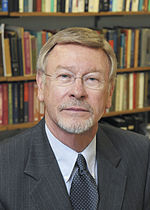Allan R. Wagner, Date of Birth, Place of Birth, Date of Death
TweetAllan R. Wagner
American psychologist
 Date of Birth: 06-Jan-1934
Date of Birth: 06-Jan-1934
 Place of Birth: Springfield, Illinois, United States
Place of Birth: Springfield, Illinois, United States
Date of Death: 28-Sep-2018
Profession: psychologist
Nationality: United States
Zodiac Sign: Capricorn 
About Allan R. Wagner
- Allan R.
- Wagner (6 January 1934 - 28 September 2018) was an American experimental psychologist and learning theorist, whose work focused upon the basic determinants of associative learning and habituation.
- He co-authored the influential Rescorla–Wagner model of Pavlovian conditioning (1972) as well as the Standard Operating Procedures or "Sometimes Opponent Process" (SOP) theory of associative learning (1981), the Affective Extension of SOP (AESOP, 1989) and the Replaced Elements Model (REM) of configural representation (2001, 2008).
- His research involved extensive study of the conditioned eyeblink response of the rabbit, of which he was one of the initial investigators (1964). Wagner received his Ph.D.
- from the University of Iowa in 1959, under Kenneth W.
- Spence, and he was on the faculty of Yale University until his death, serving as Chair of the Department of Psychology from 1983–1989, Chair of the Department of Philosophy from 1991–1993, Director of the Division of the Social Sciences from 1992–1998, and in his last years the James Rowland Angell Professor Emeritus of Psychology. Wagner's scientific contributions were recognized by his receipt of the Howard Crosby Warren Medal of the Society of Experimental Psychologists (1991), the Distinguished Scientific Contribution Award of the American Psychological Association (1999), the W.
- Horsley Gantt Medal of the Pavlovian Society (2009), the William James Lifetime Achievement Award of the Association for Psychological Science (2013), and election to membership in the National Academy of Sciences (1999).
Read more at Wikipedia

